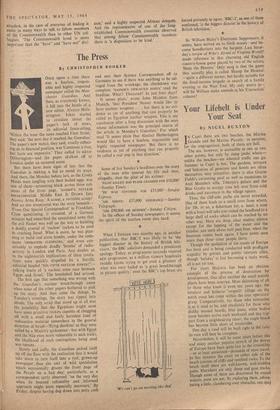The Press
By CHRISTOPHER BOOKER
But there have been signs of late that the Guardian is making a bid to mend its ways. And there, the Monday before last, as the Lively Minds were tangling with their boiled eggs, was One of them—screaming black across three col- umns of the front page. 'NASSER'S NUCLEAR BREAKTHROUGH. Middle East Is Drawn Into Atomic Arms Race.' A scoop, a veritable scoop! And no less ensational was the story beneath— `From Our Special Correspondent' in Frankfurt. Close questioning, it revealed, of a German scientist had unearthed the sensational news that the evil Nasser was well on the way to building a deadly arsenal of 'nuclear' rockets to be used in crushing Israel. What is more, he was plan- ning to build real atom bombs, under the code- flame 'OPERATION CLEOPATRA,' and even Con- ceivably to explode deadly 'bombs' of radio- activity in London and Paris. Any doubts as to the nightmarish implications of these revela- tions were quickly dispelled by a horrific editorial headed 'THE FIFTH NUCLEAR POWER?'— talking freely of `a nuclear arms race between Egypt and Israel.' The bombshell had arrived.
The first sign that something was wrong with the Guardian's nuclear breakthrough came When none of the other papers bothered to pick Up the story. And then came the deluge. In uesd a y 's evenings, the story was ripped into shreds. The only scrap that stood up at all was the possibility that the Egyptians might soon have some primitive rockets capable of chugging Off with a small and fairly harmless load of radioactive material somewhere in the general direction of Israel—Tying dustbins' as they were called by a Ministry spokesman—but with Egypt and the Nile even more vulnerable to such tricks, the likelihood of such contraptions being used was remote.
Slowly and sadly, the Guardian picked itself up off the floor with the realisation that it would take more to turn itself into a real, grown-up newspaper than the sort of wild speculation which occasionally graces the front page of the People on a. bad day; particularly, as a correspondent tartly observed, 'on the very day when its boasted rationality and informed approach might seem especially necessary.' By Friday, despite having dug down into petty cash
and sent their Science Correspondent off to Germany to see if there was anything to be sal- vaged from the wreckage, the climbdown was complete. 'NASSER'S THWARTED HOPES' read the headline. What? Thwarted? In just four days?
'It seems plain,' wrote John Maddox from Munich, 'that President Nasser would like to have nuclear weapons . . . but there is no evi- dence as yet of anything that can properly be called an Egyptian nuclear weapon. This is my conclusion after a long discussion with the man whose information was the principal source of the article in Monday's Guardian.' For which read `It seems plain that Alastair Hetherington would like to have a fearless, responsible and highly respected newspaper. But there is no evidence as yet of anything that can properly be called a real step in that direction.'
Some of last Sunday's headlines over the story of the man who insured his life and then, allegedly, shot the pilot of his airliner.
`PILOT KILLED AND PLANE CRASHED FOR £18,000'
—Sunday Times.
TIE WAS COVERED FOR L35,000'—Sunday Express.
'AIR SHOTS: £57,000 INSURANCE'—Sunday Telegraph.
'THE £90,000 AIR MURDER'—Sunday Citizen. In the offices of Sunday newspapers, it seems, the spirit of the auction room dies hard.
When I forecast two months ago, in another publication, that BBC-2 was likely to be `the biggest disaster in the history of British tele- vision,' the BBC solicitors demanded a prominent apology. Today, as programme succeeds vaunted new programme, as a million viewers hopelessly twiddle knobs trying to get even a glimmer of what was once hailed as 'a great breakthrough in picture quality,' even the BBC's top brass are 'We can't go on meeting like this'
forced privately to agree. `BBC-2', as one of them confessed, 'is the biggest disaster in the history of British television.'
Sir William Haley's Electronic Suppressors, it seems, have moved on to fresh woods—and be- come bowdlerisers into the bargain. Last Satur- day's review of Who's Afraid of Virginia Woolf? made reference to that charming old English country-house game played by two of the actors, 'Hunt the Hostess.' Only snag is that the game they actually play is called 'Hump the Hostess' —quite a different matter, but hardly suitable for the fixed-income brigade in search of a family evening in the West End. My only worry is— will Sir William make amends in his 'Correction' column?






























 Previous page
Previous page